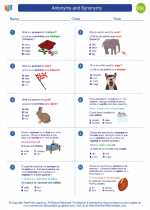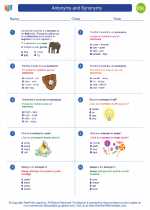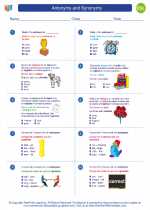Antonyms and Synonyms
Antonyms and synonyms are important concepts in language and vocabulary. Understanding antonyms and synonyms can help you improve your language skills and expand your vocabulary. Let's take a closer look at what antonyms and synonyms are and how to identify them.
Antonyms
Antonyms are words that have opposite meanings. They are words that express contrast or opposition. For example, "hot" and "cold" are antonyms because they have opposite meanings. Identifying antonyms can help you understand the nuances of language and express yourself more precisely.
Synonyms
Synonyms are words that have similar meanings. They are words that can be used interchangeably in certain contexts. For example, "happy" and "joyful" are synonyms because they have similar meanings. Knowing synonyms can help you avoid repetition in your writing and enhance your communication skills.
How to Identify Antonyms and Synonyms
Here are some tips for identifying antonyms and synonyms:
- Pay attention to context: Understanding the context in which a word is used can help you identify whether it is an antonym or a synonym of another word.
- Use a thesaurus: A thesaurus is a great tool for finding synonyms of a word. It can also help you identify antonyms by providing words with opposite meanings.
- Practice with word pairs: Engage in activities that involve matching antonyms and synonyms, such as crossword puzzles or word association games.
Study Guide
Here are some activities to help you practice and master antonyms and synonyms:
- Create flashcards: Make flashcards with pairs of antonyms and synonyms. Review them regularly to reinforce your understanding.
- Write sentences: Practice using antonyms and synonyms in sentences to understand their usage in context.
- Play word games: Engage in word games like "Antonym Bingo" or "Synonym Scramble" to make learning more fun and interactive.
By understanding and practicing antonyms and synonyms, you can enhance your language skills and become a more effective communicator.



